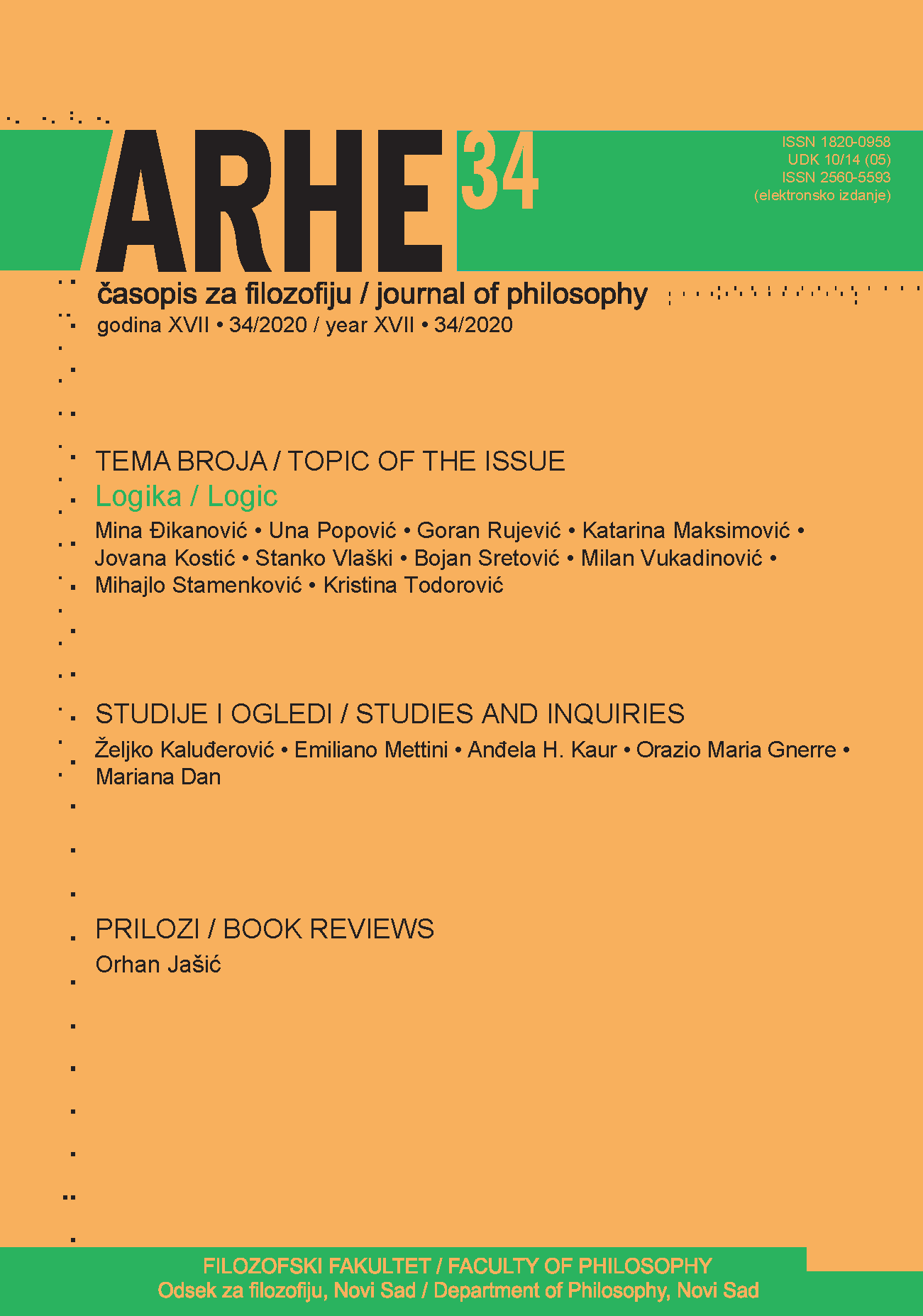RUTINIZATION OF GENETIC TESTING AND DISABILITY, A BIOETHICAL ANALYSIS
Main Article Content
Abstract
Technological advancements in biomedicine introduce new ethical questions in the practice of medicine. The invention of non-invasive genetic testing is one example that calls for problematization of the achievements in biomedical science. Since the commercialization of non-invasive genetic testing in the United States and globally, genetic testing has been increasingly popularized as a necessary part of routine health care. This paper argues that the routinization of genetic testing increases disability discrimination in the professional practice of medicine and normalizes disability prejudice in the society.
Article Details
How to Cite
KAUR, A. H. (2021). RUTINIZATION OF GENETIC TESTING AND DISABILITY, A BIOETHICAL ANALYSIS. Arhe, 17(34), 275–293. https://doi.org/10.19090/arhe.2020.34.275-293
Section
STUDIES AND INQUIRIES
References
Agarwal, A., Sayres, L. C., Cho, M. K., Cook-Deegan, R., & Chandrasekharan, S. (2013). Commercial landscape of noninvasive prenatal testing in the United States. Prenatal diagnosis, 33 (6), 521–531.
Amundson, T. (2008). Bioethics and disability rights: Conflicting values and perspectives. Journal of Bioethical Inquiry, 5(2), 111–123.
Andrews, L. B. (1996). Prenatal screening and the culture of motherhood. Hastings L.J., 47, 967 – 998.
Asch, A. (2001). Disability, bioethics and human rights in Albrecht, G., Seelman, K., & Bury, M. (eds.) (2001). Handbook of disability studies. Sage Publications, 297-327.
Farrell, R., Agatisa, P., Mercer, M., Mitchum, A., & Coleridge, M. (2016). Expanded indications for noninvasive prenatal genetic testing: Implications for the individual and the public. Ethics, Medicine, and Public Health, 2(3), 383–391.
Hall, D. E., Prochazka, A. V., & Fink, A. S. (2012). Informed consent for clinical treatment. CMAJ: Canadian Medical Association journal = Journal de l'Association medicale canadienne, 184(5), 533–540.
Longmore, P. K., (1995). Medical decision making and people with disabilities: A clash of cultures. Journal of Law and Medical & Ethics 23 (1), 82-87.
Mollie A. Minear, M.A., Alessi, S., Allyse, M., Michie, M., and Chandrasekharan, S. (2015). Noninvasive Prenatal Genetic Testing: Current and Emerging Ethical, Legal, and Social Issues. Annual Review in Genomics and Human Genetics 16, 369-98.
Murray, B. (2012). Informed consent: what must a physician disclose to a patient. Virtual Mentor. 2012; 14(7):563-566. doi: 10.1001/virtualmentor.2012.14.7.hlaw1-1207. https://journalofethics.ama-assn.org/article/informed-consent-what-must-physician-disclose-patient/2012-07
National Council on Disability (2019). Genetic testing and the rush to perfection (Bioethics and Disability Series). U.S. National Council on Disability.
Newell, C. (2006). Disability, bioethics, and rejected knowledge. Journal of Medicine & Philosophy, 31(3), 269–283.
Norwitz, E. R., Phaneuf E. L., i Levy, B. (2016) Noninvasive prenatal testing: The future is now. Review in Obstetrics and Gynecology 6(2): 48-62.
Ouellette, A. (2011). Bioethics and disability: Toward a disability-conscious bioethics (Cambridge Disability Law and Policy Series). Cambridge: Cambridge University Press.
Parens, E. and Asch, A. (2003). Disability rights critique of prenatal genetic testing: Reflections and recommendations. Ment. Retard. Dev. Disabil. Res. Rev., 9: 40-47
Parens, E., & Asch, A. (1999). The disability rights critique of prenatal genetic testing: Reflections and recommendations. The Hastings Center Report, 29(5), 1–24.
Prenatally and Postnatally Diagnosed Conditions Awareness Act, Pub. L. No.110–374, § 2(1)–(3), 122 Stat. 4051, 4051 (2008)
Ravitsky, V. (2017). The shifting landscape of prenatal testing: Between reproductive autonomy and public health. Just Reproduction: Reimagining Autonomy in Reproductive Medicine, special report, Hastings Center Report 47, no. 6 (2017): S34-S40.
Suter, S. (2002). Routinization of Prenatal Testing. American Journal of Law and Medicine 28, 233-270.
Scully, J. (2008). Disability and genetics in the era of genomic medicine. Nature Reviews. Genetics, 9(10), 797–802.
Scully, J. (2008). Disability bioethics: Moral bodies, moral difference. Lantham: Rowman&Littlefield Publishers, Inc.
Amundson, T. (2008). Bioethics and disability rights: Conflicting values and perspectives. Journal of Bioethical Inquiry, 5(2), 111–123.
Andrews, L. B. (1996). Prenatal screening and the culture of motherhood. Hastings L.J., 47, 967 – 998.
Asch, A. (2001). Disability, bioethics and human rights in Albrecht, G., Seelman, K., & Bury, M. (eds.) (2001). Handbook of disability studies. Sage Publications, 297-327.
Farrell, R., Agatisa, P., Mercer, M., Mitchum, A., & Coleridge, M. (2016). Expanded indications for noninvasive prenatal genetic testing: Implications for the individual and the public. Ethics, Medicine, and Public Health, 2(3), 383–391.
Hall, D. E., Prochazka, A. V., & Fink, A. S. (2012). Informed consent for clinical treatment. CMAJ: Canadian Medical Association journal = Journal de l'Association medicale canadienne, 184(5), 533–540.
Longmore, P. K., (1995). Medical decision making and people with disabilities: A clash of cultures. Journal of Law and Medical & Ethics 23 (1), 82-87.
Mollie A. Minear, M.A., Alessi, S., Allyse, M., Michie, M., and Chandrasekharan, S. (2015). Noninvasive Prenatal Genetic Testing: Current and Emerging Ethical, Legal, and Social Issues. Annual Review in Genomics and Human Genetics 16, 369-98.
Murray, B. (2012). Informed consent: what must a physician disclose to a patient. Virtual Mentor. 2012; 14(7):563-566. doi: 10.1001/virtualmentor.2012.14.7.hlaw1-1207. https://journalofethics.ama-assn.org/article/informed-consent-what-must-physician-disclose-patient/2012-07
National Council on Disability (2019). Genetic testing and the rush to perfection (Bioethics and Disability Series). U.S. National Council on Disability.
Newell, C. (2006). Disability, bioethics, and rejected knowledge. Journal of Medicine & Philosophy, 31(3), 269–283.
Norwitz, E. R., Phaneuf E. L., i Levy, B. (2016) Noninvasive prenatal testing: The future is now. Review in Obstetrics and Gynecology 6(2): 48-62.
Ouellette, A. (2011). Bioethics and disability: Toward a disability-conscious bioethics (Cambridge Disability Law and Policy Series). Cambridge: Cambridge University Press.
Parens, E. and Asch, A. (2003). Disability rights critique of prenatal genetic testing: Reflections and recommendations. Ment. Retard. Dev. Disabil. Res. Rev., 9: 40-47
Parens, E., & Asch, A. (1999). The disability rights critique of prenatal genetic testing: Reflections and recommendations. The Hastings Center Report, 29(5), 1–24.
Prenatally and Postnatally Diagnosed Conditions Awareness Act, Pub. L. No.110–374, § 2(1)–(3), 122 Stat. 4051, 4051 (2008)
Ravitsky, V. (2017). The shifting landscape of prenatal testing: Between reproductive autonomy and public health. Just Reproduction: Reimagining Autonomy in Reproductive Medicine, special report, Hastings Center Report 47, no. 6 (2017): S34-S40.
Suter, S. (2002). Routinization of Prenatal Testing. American Journal of Law and Medicine 28, 233-270.
Scully, J. (2008). Disability and genetics in the era of genomic medicine. Nature Reviews. Genetics, 9(10), 797–802.
Scully, J. (2008). Disability bioethics: Moral bodies, moral difference. Lantham: Rowman&Littlefield Publishers, Inc.
